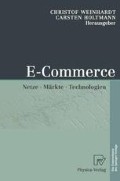Zusammenfassung
Die Frage der Sicherheit und des Vertrauens spielt für eine mögliche wirtschaftliche Nutzung von anonymen P2P-Netzwerken eine zentrale Rolle. Der vorliegende Beitrag erläutert die Begriffe und Möglichkeiten der Schaffung von Vertrauen in wirtschaftlichen Transaktionen und zeigt auf welche zentralen und dezentralen Institutionen aus dem E-Commerce übernommen werden können, um eine derP2P-Netzwerkarchitektur angepasste Vertrauensgenese als Voraussetzung wirtschaftlicher Anwendungen zu unterstützen.
Access this chapter
Tax calculation will be finalised at checkout
Purchases are for personal use only
Preview
Unable to display preview. Download preview PDF.
Literatur
Abdul-Raman A, Hailes S (1997) A Distributed Trust Model. Proceedings of the Workshop on New Security Paradigms. ACM Press, Cumbria, UK, S 48–60
Adar E, Huberman BA (2000) Free Riding on Gnutella. First Monday 5 (10)http://www.Firstmonday.clidissues/issue5_10/
Biglaiser G (1993) Middlemen as experts. RAND Journal of Economics 24 (2) S 212–223 Burrows D (2002) Dave’s Magic: The Gathering Trading Post Websitehttp://www.forestelves.com/magic.htm
Coppel J (2000) E-Commerce: Impacts and Policy Challenges. Economics Department Working Papers No. 252 OECD, Parishttp://www.olis.oecd.org/olis/2000doc.nsf/linkto/eco-wkp(2000)25/olis/2000doc.nsf/linkto/eco-wkp(2000)25
Dingledine R, Freedman MJ, Molnar D Free Haven. In: Oram A (Hrsg) Peer-to-Peer: Har-nessing the Power of Disruptive Technologies. O’Reilly, Sebastopol, CA, S 159–190
Eggs H (2001) Vertrauen im Electronic Commerce: Herausforderungen und Lösungsansätze. Dissertation, Albert-Ludwigs-Universität Freiburg, Freiburg. Deutscher Universitäts Verlag, Wiesbaden
Eggs H, Englert J (1999) Electronic Commerce Enquête II 1999/2000. Konradin-Verlag, Stuttgart
Hirsch Av (1976) Doing Justice: The Choice of Punishments. Hill and Wang, New York
Hirshleifer J, Riley JG (1979) The Analytics of Uncertainty and Information - An Expository Survey. Journal of Economic Literature XVII: S 1375–1421
Lane C (1998) Introduction: Theories and Issues in the Study of Trust. Trust within and between organizations: conceptual issues and empirical applications. Oxford University Press, Oxford, S 1–30
Lethin R (2001) Reputation. In: Oram A (Hrsg) Peer-to-Peer: Harnessing the Power of Disruptive Technologies. O’Reilly, Sebastopol, CA, S 341–353
Louveaux S, Salaun A, Poullet Y (1999) User Protection in Cyberspace, INFO 1 (6), S 521–537
Luhmann N (1989) Vertrauen. Ein Mechanismus zur Reduktion sozialer Komplexität. 3. durchges. Aufl. Ferdinand Encke Verlag, Stuttgart
McKnight DH, Chervany NL (1996) The Meanings of Trust. Technical Report 96–04 Carlson School of Management University of Minnesota.http://misrc.umn.edu/wpaper/WorkingPapers/9604.pdf
Müller G, Rannenberg K (1999) Multilateral Security in Communications Addison Wesley Longman, München 54 Holger Eggs, Stefan Sackmann, Torsten Eymann, Günter Müller
OECD (2000) Leitlinien für den Verbraucherschutz in Zusammenhang mit dem elektronischen Geschäftsverkehr. Organisation for Economic Cooperation and Development (OECD), Paris.http://www.econsumer.gov/german/oecd-german.pdf/german/oecd-german.pdf
OpenRatings (2002)Open Ratings Website. OpenRatings, Inc.http://www.openratings.com
Padovan B (2000) Ein Vertrauens-und Reputationsmodell für Multi-Agenten Systeme. Dissertation, Albert-Ludwigs-Universität Freiburg, Freiburg
Powell WW (1996) Trust-Based Forms of Governance. In Kramer RM, Tyler TR (Hrsg) Trust in Organizations: Frontiers of Theory and Research. Sage Publications, Thousand Oaks, CA, S 51–67
Ripperger T (1998) Ökonomik des Vertrauens - Analyse eines Organisationsprinzips. Mohr Siebeck, Tübingen
Sako M (1998) Does trust improve business performance? In Lane C, Backmann RH (Hrsg) Trust within and between organizations: conceptual issues and empiricial applications. Oxford University Press, Oxford
Shapiro S (1987) The social control of impersonal trust. American Journal of Sociology 93 (3), S 623–658
Simon HA (1957) Models of Man - Social and Rational. John Wiley & Sons, New York
Smith A (1776) An inquiry into the nature and causes of the wealth of nations. Printed for W. Strahan; and T. Cadell, London
Spremann K (1996) Wirtschaft, Investition und Finanzierung, 5. Aufl. Oldenbourg, München
Waldman M, Cranor LF, Rubin A (2001) Trust. In: Oram A (Hrsg) Peer-to-Peer: Harness-ing the Power of Disruptive Technologies. O’Reilly, Sebastopol, CA, S 242–270
Webassured (2002) Webassured Watchlist. Webassuredlnchttp://www.webassured.com/watchlis/watchlist.cfm
Williamson OE (1985) The Economic Institutions of Capitalism. Free Press, New York
Author information
Authors and Affiliations
Editor information
Editors and Affiliations
Rights and permissions
Copyright information
© 2002 Springer-Verlag Berlin Heidelberg
About this paper
Cite this paper
Eggs, H., Sackmann, S., Eymann, T., Müller, G. (2002). Vertrauensgenerierende Institutionen Für P2P-Netzwerke. In: Weinhardt, C., Holtmann, C. (eds) E-Commerce. Physica, Heidelberg. https://doi.org/10.1007/978-3-642-57487-0_3
Download citation
DOI: https://doi.org/10.1007/978-3-642-57487-0_3
Publisher Name: Physica, Heidelberg
Print ISBN: 978-3-642-63274-7
Online ISBN: 978-3-642-57487-0
eBook Packages: Springer Book Archive

